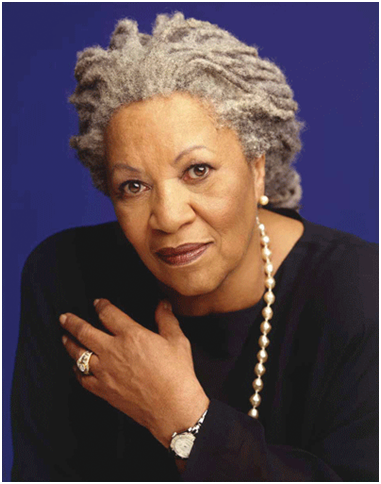Get power-to without leaving home!
Join me for a No Excuses Facebook chat on my fanpage Sunday, March 25, at 3pm eastern, 2pm central, 1pm mountain, noon pacific, etc. I’ll be on video, you’ll be able to ask questions and talk with others via chat box. It’s easy. Really. And there will be giveaways! Let me know if you’re coming here.
“I’ve just insisted – insisted! – upon being called a black woman novelist…And I decided what that meant, because I have claimed it. As a black and a woman, I have had access to a range of emotions and perceptions that were unavailable to people who were neither.”
It’s Women’s History Month and I can’t resist profiling Toni Morrison, a prolific writer who has worked to represent through fiction the experience of black people—particularly women–in America. Ms. Morrison’s novels focus on marginalized characters struggling to find their place in a society built upon the legacy of slavery and the violence of racial prejudice. Most known for her imaginative fiction, Morrison has also written essays, non-fiction, plays, a libretti, and children’s books.
Ms. Morrison developed her first novel, The Bluest Eye (1970), while raising two children and teaching at Howard University. She later took a job as an editor at Random House, where she played a vital role in bringing black literature into the mainstream, editing books by authors such as Toni Cade Bambara, Angela Davis, and Gayl Jones.
Commercially successful and critically acclaimed, her 1987 Pulitzer Prize winning novel Beloved was chosen by a New York Times survey of prominent writers to be the best work of American fiction of the previous 25 years. In Beloved, Morrison imagines what it would have felt like to be Margaret Garner, a fugitive slave woman who chose to kill her infant daughter rather than see her grow up in slavery.
In an interview with the Paris Review, Morrison says about Margaret Garner: “I really don’t know anything about her. What I knew came from reading two interviews with her. They said, ‘Isn’t this extraordinary. Here’s a woman who escaped into Cincinnati from the horrors of slavery and was not crazy. Though she’d killed her child, she was not foaming at the mouth. She was very calm; she said, I’d do it again.’ That was more than enough to fire my imagination.”
Ms. Morrison, who has won the Nobel Peace Prize, the National Book Critics Circle Award and the Pulitzer Prize for her fiction work, is one of the most acclaimed American writers of our day. The popularity of her work is indicative of an American reading public open to narratives that are not written and centrally peopled by white males. Reader’s receptivity to Morrison’s work marks a shift in the cultural imagination, a fundamental challenge to norms prescribing what narratives are read and whose histories deserve commemoration.
As we strive everyday to improve our thoughts, words, and treatment of other people, we must challenge our opinions by opening ourselves up to different perspectives and subject positions. Toni Morrison’s work allows us to do just that. She allows us to feel the struggles of lives and bodies that have been marked in a history of American oppression, making us better able to thus identify race, gender or class based subjugation in our everyday lives.
If you haven’t read anything of hers, consider picking up a novel next time you’re browsing Amazon, the bookstore or the library. And look forward to the publication of her next novel Home, to be released this May.
Catherine Engh
Latest posts by Catherine Engh (Posts)
- Slutwalks and Such: Who’s Making Women’s History Today? - April 2, 2012
- “Black Woman Novelist” -Toni Morrison Defines Her Own Terms - March 23, 2012
- Lesser-Known Women Often Make History - March 19, 2012






 "Female Writers Kicking Up Literary Dust"
"Female Writers Kicking Up Literary Dust"